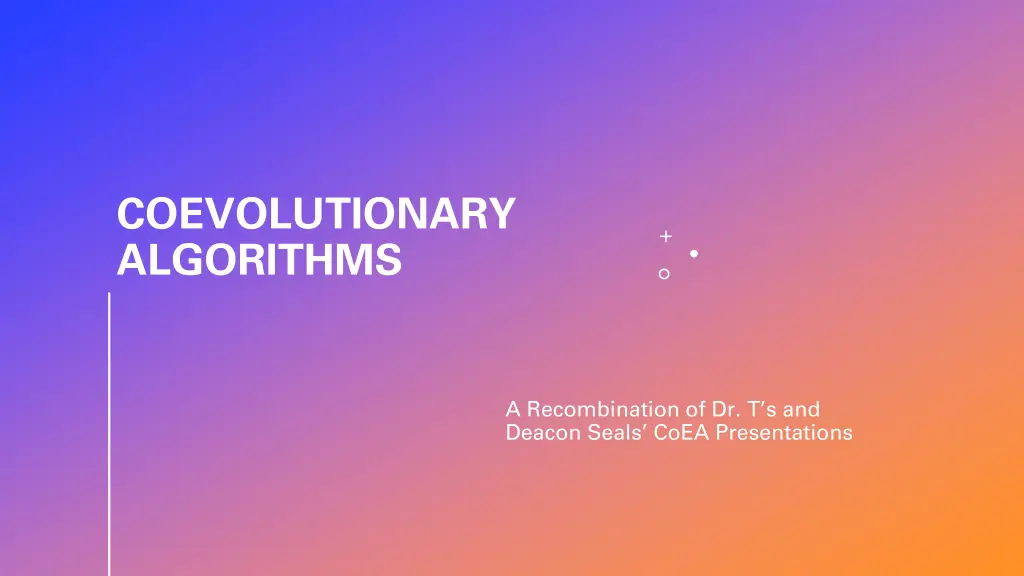
Understanding Coevolutionary Algorithms and Their Applications
Discover the concept of Coevolutionary Algorithms (CoEAs), a unique type of Evolutionary Algorithm where the fitness of individuals depends on other individuals. Explore various types of Coevolution and classic issues associated with CoEAs, along with interactive competitive problems often tackled through these algorithms. Dive into real-world examples and presentations showcasing how CoEAs can be leveraged in different scenarios.
Download Presentation

Please find below an Image/Link to download the presentation.
The content on the website is provided AS IS for your information and personal use only. It may not be sold, licensed, or shared on other websites without obtaining consent from the author. If you encounter any issues during the download, it is possible that the publisher has removed the file from their server.
You are allowed to download the files provided on this website for personal or commercial use, subject to the condition that they are used lawfully. All files are the property of their respective owners.
The content on the website is provided AS IS for your information and personal use only. It may not be sold, licensed, or shared on other websites without obtaining consent from the author.
E N D
Presentation Transcript
COEVOLUTIONARY ALGORITHMS A Recombination of Dr. T s and Deacon Seals CoEA Presentations
Definition A Coevolutionary Algorithm (CoEA) is special type of EA where the fitness of an individual is dependent on other individuals. (i.e., individuals are explicitly part of the environment). 2
Two-Population CoEA Example Parent Selection Parent Selection Termination Check Child Termination Check Child Generation Generation Survival Selection Fitness Evaluation Survival Selection Fitness Evaluation Fitness Evaluation Interaction 3
Types of Coevolution Cooperative coevolution Evolving subcomponents of a whole solution Ghost and map co-evolution Competitive coevolution Evolving conflicting solutions with conflicting fitness values Test-based coevolution Evolve a harder challenge to encourage refinement of the primary solution of interest Pac-Man and map coevolution Hillis, W. D. (1990). Co-evolving parasites improve simulated evolution as an optimization procedure. Physica D: Nonlinear Phenomena, 42(1 3), 228 234. https://doi.org/10.1016/0167-2789(90)90076-2 Interactive coevolution Evolve solutions that dynamically interact with one another Ghost and Pac-Man coevolution 4
Interactive Competitive Problems Often games Symmetric games Players conflict over shared objective(s) Players typically have access to the same capabilities Can be explored with single-population self-play Asymmetric games Players have distinct notions of success that may conflict indirectly Players may have access to different capabilities Canonically explored using multiple types of agent (species) 5
Classic CoEA Issues Known stability pathologies Cycling (forgetting with repeated rediscovery) Rosin s Hall of Fame Mediocre stability (premature convergence to suboptimal equilibrium) Disengagement (vanishing search gradient) Rosin s Phantom Parasite Overspecialization (overfitting in ML) Fitness sampling cost Required number of fitness evaluations to achieve accurate estimation can grow exponentially with population sizes Exacerbated by intransitivity in the problem Methods like genetic programming are known to benefit from very large population sizes Koza used population sizes in the millions Asymmetric games can exacerbate disengagement Species may have an easier or harder improving/finding a search gradient 6
Modern CoEA Issues Local progress historical progress global progress Local progress: against current generation of opponents Historical progress: against opponents from past generations Global progress: against all possible opponents Training data Set of samples used to perform optimization Evaluation data Set of examples not encountered during optimization to assess performance Training and evaluation sets are too often mixed (called data poisoning in other AI domains) Miconi, T. (2009). Why Coevolution Doesn t Work : Superiority and Progress in Coevolution. Lecture Notes in Computer Science (Including Subseries Lecture Notes in Artificial Intelligence and Lecture Notes in Bioinformatics), 5481 LNCS, 49 60. https://doi.org/10.1007/978-3-642-01181-8_5 7
Modern CoEA Issues Historical progress can be deceptive and is often conflated with global progress Run with poor historical progress outperformed run with good historical progress in global performance approximation This might call into question the impact of pathologies predicated on historical progress in interactive competitive problems Hall of fame methods can hinder global progress by overemphasizing progress against historical opponents So-called evolutionary arms races seem to ignore fundamental characteristics of global optimality How to tune CoEAs?!? Miconi, T. (2009). Why Coevolution Doesn t Work : Superiority and Progress in Coevolution. Lecture Notes in Computer Science (Including Subseries Lecture Notes in Artificial Intelligence and Lecture Notes in Bioinformatics), 5481 LNCS, 49 60. https://doi.org/10.1007/978-3-642-01181-8_5 8
Miscellaneous Additional Publications Multi-population (not quite island model) single species co- evolution with comparison of GP and neuroevolution Togelius, J., Burrow, P., & Lucas, S. M. (2007). Multi-population competitive co-evolution of car racing controllers. 2007 IEEE Congress on Evolutionary Computation, CEC 2007, 4043 4050. https://doi.org/10.1109/CEC.2007.4424998 Stable competitive co-evolution with clustering-based opponent selection and alternating population freezing Simione, L., & Nolfi, S. (2018). Achieving long-term progress in competitive co-evolution. 2017 IEEE Symposium Series on Computational Intelligence, SSCI 2017 - Proceedings, 2018-January, 1 8. https://doi.org/10.1109/SSCI.2017.8280898 Skirts the analysis problem by observing behavioral complexification? 9
